World War Two: Week by Week - Season 1

Season 1
Year 1

Episodes
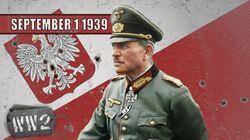
September 1, 1939
When Germany invades Poland on September 1, 1939, the world is already at the brink of a new world war…
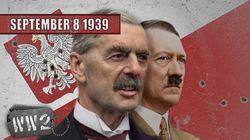
September 8, 1939
The German-Polish war is the match that ignites the flames that finally burn British Prime Minister Neville Chamberlain's appeasement efforts to the ground.

September 15, 1939
When the Wehrmacht and the SS continue devastating Poland and her people in the first weeks of September, her last chance is her western allies.

September 22, 1939
When the USSR crushes the plans of the Allies for Poland and the Japanese plans in China in the same week, it is Germany that benefits.
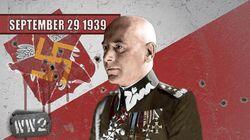
September 29, 1939
Facing two enemies at once, Poland finds itself in a crushing vice after less than a month of war and the Polish forces must flee their own country to live to fight another day.
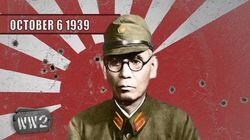
October 6, 1939
In the West, the sun sets on Poland as the last forces surrender, but her defenders are already regrouping abroad. In the East, the sun rises on China as Japan meets yet another defeat.

October 13, 1939
While the Third Reich and USSR consolidate their Polish conquest, their leaders are wary of each other but turn the attention to the next prize. Stalin moves to the North and Hitler pushes for an attack in the West.

October 20, 1939
For the men in the navies of the warring nations in Europe, there was nothing phony about WW2 in October 1939 - mortal danger was immediately under the cold surface at the receiving end of a torpedo or a depth charge...
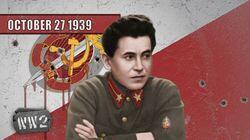
October 27, 1939
The persecution, incarceration, enslavement and murder of the Polish people in occupied Poland is driven by ideological hatred for both Nazi Germany and Soviet Russia, but it's also a personal matter for Joseph Stalin.

November 3, 1939
Ten weeks into World War Two, and the Allied ground forces are bored in France. In North-Eastern Europe, Poland's suffering has no end and Finland is in the crosshairs of the USSR.

November 10, 1939
As Hitler drives for a fast invasion he faces covert and open resistance, even an assassination attempt. In the background British and German agents and double agents play a game of betrayal and counter-betrayal.
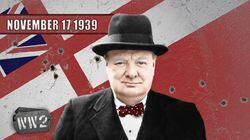
November 17, 1939
While the Finnish and the Soviets seem to be moving ever closer to war, the Royal Navy is losing ships at a frightening rate to an explosive threat not yet understood.

November 24, 1939
The European Allies seek a countermeasure to the mysterious German mines, in China the Japanese advance, and in Poland it is the beginning of the Warsaw Ghetto.

December 1, 1939
On the final day of November 1939 the Red Army of the USSR invades Finland and the Winter War begins.

December 8, 1939
When the Red Army invades Finland they get a cold reception and a pretty nasty surprise. It looks like team Stalin might just be skating on some very thin ice.
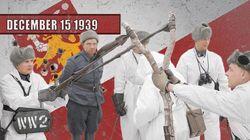
December 15, 1939
In the second week of the Winter War, during multiple counteroffensives, including the famous Sausage War, the Finnish Defence Forces dash any hopes of a quick victory that the Red Army and Stalin might have had.
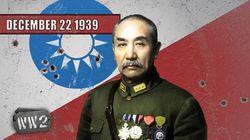
December 22, 1939
While the Winter War continues with a Soviet armoured attack at Summa and the Lähde Road and the British attack the Germans from the skies in the first official aerial battle of World War Two, there's trouble in China. Chiang Kai Shek is looking for ways to gain a new advantage on the Japanese.
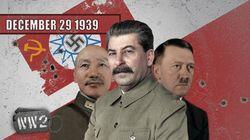
December 29, 1939
The Chinese Nationalists under command of Chiang Kai Shek is desperately looking to make new or restore old, allies to aid them in their fight against the Japanese. Meanwhile, the Soviets are still struggling to turn the Winter War against the Finnish in their favor.

January 5, 1940
In Finland the invading Red Army suffers catastrophic casualties, while in China the Nationalists are divided as Japan uses diplomacy to strike back.
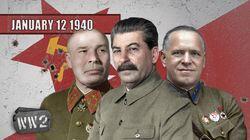
January 12, 1940
After the chaotic invasion and catastrophic losses of the first weeks of the Winter War, the Soviet Army has learnt their lesson. Further west the Wehrmacht is ready to move, as long as the skies stay clear.

January 19, 1940
As the Winter War rolls on the only help the Finns are getting are from volunteers. The Western Allies still have their thoughts on Norway, little do they know that the Phoney War almost ends this week...

January 26, 1940
This week shows the Allies first attempts to break the German Enigma code. Meanwhile, the German war economy shows some flaws and the Soviets are massing artillery in an effort to break the Finnish defences.
As the Winter War rolls on the only help the Finns are getting are from volunteers. The Western Allies still have their thoughts on Norway, little do they know that the Phoney War almost ends this week...

February 2, 1940
The Soviet forces revive their winter offensive this week. More men, more tanks and more artillery are brought in to try to force a breakthrough in the Finnish lines. Meanwhile, Churchill encounters resistance to his plan to cut of the German iron trade with Sweden.
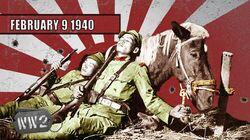
February 9, 1940
While the Winter War rages on in Finland, Japan is confronted with a dilemma. Keep fighting the Chinese and face huge problems feeding the populace in Japan and their newly conquered territories or withdraw and face your own populace to whom you've promised a glorious victory.

February 16, 1940
After more than a week of preliminary bombardmends and attacks, the Red Army finally attacks the Finnish defensive positions on the Karelian Isthmus en masse. They throw thousands of troops at the Finns at the entire width of their lines, even exceeding them. The Finns defend the best as they can, but their winning streak seems to come to an end.
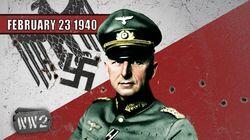
February 23, 1940
German Genral Erich von Manstein has a cunning plan. And as it happens, it's just how Hitler likes it. This week, the German war plans change quite drastically. In the meantime, the Soviet Red Army continues it push through the Finnish Mannerheim line, except for a stubborn Finnish pocket of resistance at Taipale.

March 2, 1940
The German plans for the invasion of Western Europe start taking shape. Mansteins plan is innovative, bold and controversial, but Hitler likes it. If everything goes according to his plan, the Germans will be celebrating their victory in Paris come spring.

March 9, 1940
The French promise to send troops to aid Finland, though the majority is planned to go to Norway or Sweden. In return, the Finns postpone their peace talks with the Soviets. It is at that moment that the Finns realise that the French are playing tricks and the Soviets are not to be messed with. It's deal or no deal, and they need to decide quick.

March 16, 1940
The Winter War is over. The Allies tried to stall the Finns for as long as possible to justify their invasion of Norway, but the Finns have had it and don't trust the British and French to come to their aid. This week, the Finns sign a peace agreement with the Soviet in Moscow.

March 23, 1940
French Prime Minister Daladier overplays his hand and is replaced after his vision regarding Scandinavia wasn't widely shared in the French parliament. Meanwhile, the French and British in France are preparing for a German attack. If Hitler gets it his way, they will also have to prepare for an attack in the south as Hitler tries to persuade Mussolini to join his invasion.
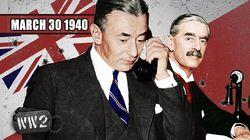
March 30, 1940
Newly appointed French Prime Minister Paul Reynaud and his British counterpart Neville Chamberlain spend the week looking for ways to harm the Germans. Not just by targeting their direct opponent directly, but also by exploring the idea of expanding the war into much bigger territory. In the meantime, the French prepare for the expected invasion and the Allies are laying the foundations of what might one time become a weapon of mass destruction.

April 6, 1940
While China gets a new government, or at least in the eyes of Japan, the British are trying to cope with the rationing of meat and dairy products by trying out some new recipes. More importantly, Germany seems to be very serious about invading Norway. However, the British also plan to move closer to Norway.
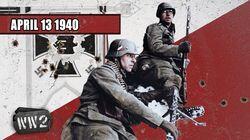
April 13, 1940
This week, the Phoney War seems to come to an end when Germany invades Denmark and Norway. The Allies seek confrontation with the Germany in the hope to at least deny them full access to the Swedish Iron mines. Nevertheless, the Germans are prepared and have been planning this for weeks. It looks like it will cost a lot to put a stop to this.
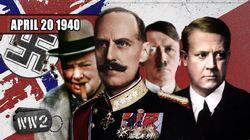
April 20, 1940
The German Invasion of Norway is still very much in full swing. The German Wehrmacht is moving north from Oslo, where a Norwegian force is trying to halt them in anticipation of Allied reinforcements. The British do land in Norway, but don't necessarily rush to relief the Norwegian army. Meanwhile, Norwegian 'traitor' and 'failure' Vidkun Quisling rises to be the new leader of Norway – only to get rejected by Hitler again. Numerous powers are now trying to grab, restore or consolidate military or political power in Norway. It's a mess.
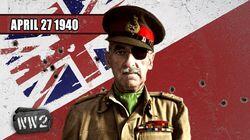
April 27, 1940
The Invasion and subsequent Battle of Norway has only just begun when the British decide to pull back. Poor planning and misfortune after misfortune harms the British campaign, which becomes very apparent this week while the fighting continues. Almost everywhere, except for in the far north, the Allied troops pull back under heavy German pressure.
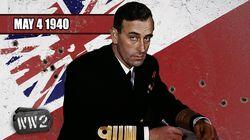
May 4, 1940
Allied plans to take Trondheim in Norway to allow for larger reinforcements and even bigger aerial support to come in are disbanded as the troops approaching Trondheim are pulled back from Norway. While the Allied efforts in Norway lose force there, the Allied forces in Western Europe are prepared for a German invasion through the Benelux countries. The Japanese too are determined to continue their campaign in China, and send thousands more young men into the battlefields.
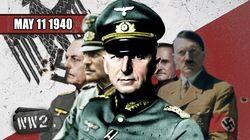
May 11, 1940
As the Allied troops in Central Norway are evacuated and the Norwegian troops there surrender to the Germans, the Allied position around Narvik is still quite strong. With the addition of roughly 5000 Polish soldiers, the French, British and Norwegian force will prove to be a formidable foe for the Germans up North. This week however, the war drastically changes as not three but four Neutral countries are invaded. The Phoney War is ultimately over.
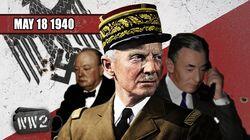
May 18, 1940
The German invasion of Western Europe has been going for over a week now, and the Neutral and Allied countries are in disarray. The Netherlands, despite putting up fierce resistance on some occasions, faces overwhelming powers while Belgium, France and the British feel the pressure from an organised and armoured assault from the Ardennes. And still, the German tanks, soldiers and aircraft are not all the Allies have to fear, as many of their losses are caused by their own command.

May 25, 1940
While the massive invasion of the Benelux countries and France was going down last week, things were also developing on the fronts in Norway and China. But this week, the German beast is let loose. After breaking through its cage at Sedan last week, nothing seems strong enough to block its way to the English Channel. And if one thing becomes clear, it is that the Allied command structure and the way they communicate is one big smoking mess...
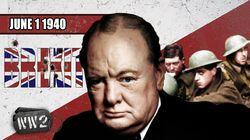
June 1, 1940
When the Germans Panzers move north from Calais, the British Expeditionary Force and France's soldiers still fighting in Belgium and Northern France are trapped between a numerically superior German army. A big operation codenamed 'Dynamo' is set up to evacuate as many as possible from Dunkirk.

June 8, 1940
As the battle for France is still raging but looks like a ringing victory for Nazi Germany, and the encircled troops in Dunkirk have been evacuated, will Great Britain remain in the war? If so will British forces remain in continental Europe? In fact will Great Britain even be able to remain an independent nation, or also fall to the Nazis?

June 15, 1940
The fighting in France isn't over, not even when Paris falls, as the Germans advance and Italy joins the fight. But the Brits now have their back to yet another ocean and see no option but out. Further east Stalin uses the chaos in the West as cover to start moving in on his neighbours.
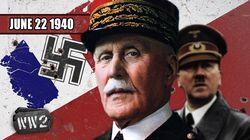
June 22, 1940
While the fighting subsides in much of France, the Italians invade in the south, while tension continues to grow in the Baltic states as the Red Army increases its presence and the USSR makes plans for coups.

June 29, 1940
Hitler goes to Paris, while Stalin occupies more territory... but something is on Stalin's mind. News of the sudden success of the Wehrmacht in the West is not what he had hoped for. Churchill also looks to the West for help while a German invasion of the British Isles seems imminent. Far East the Japanese are on the advance.

July 6, 1940
The repercussions of the fall of France are not yet seen in full. But this week Britain makes it clear it isn't about to give up, even if it will mean some really hard decisions.
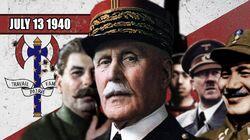
July 13, 1940
The Germans and the French in Vichy consolidate their newly acquired power as the British deal with the remnants of the French navy. The Battle of Britain begins with fighting above the English Channel, a battle with great consequences for the future of Europe.

July 20, 1940
Peace seems to slowly return to the European mainland, but not for long, as the Germans move their airplanes to the French coast to Battle Britain in the skies while they make invasion plans, and the Soviets are entering the Baltics after 'elections' invited them to.

July 27, 1940
Hitler searches for ways to force Britain out of the war, but the British sit safely behind their cliffs, their channel and their Royal Navy. Engaging the navy and invading Britain would require a major air-superiority. As a result, the Germans plan to knock the British out of the skies. This is the Battle of Britain.

August 3, 1940
As the Kanalkampf comes to a close, the Battle of Britain heats up. Hitler wants Britain out of the war. But before the Germans can invade Britain, it will have to deal with the Royal Air Force and the Royal Navy.

August 10, 1940
This week, the war spreads to Africa, when the Italians invade the British Colony of British Somaliland. While this might seem trivial, it might have tremendous consequences on the remainder of the war.

August 17, 1940
As the Battle of Britain reaches not seen before levels of intensity, one of the British colonies is lost to the Italians.

August 24, 1940
This week, the communists attack the Japanese in the Battle of 100 Regiments. Meanwhile in Europe, the Battle of Britain enters phase three with the Luftwaffe actively targeting British airfields.

August 31, 1940: WW2 1 Year
As the war turns one year old, there seems to be no end in sight. The Luftwaffe starts targeting civilian areas of London, the peoples of Eastern Europe switch country without moving houses, in occupied territory the population continues to be terrorized, and an end to the Chinese war that has been raging on for years now seems ever further away.
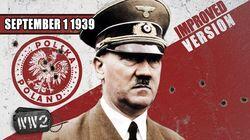
September 1, 1939 (Improved Version)
When Germany invades Poland on September 1, 1939, the world is already at the brink of a new world war…

September 8, 1939 (Improved Version)
The German-Polish war is the match that ignites the flames that finally burn British Prime Minister Neville Chamberlain's appeasement efforts to the ground.

September 15, 1939 (Improved Version)
When the Wehrmacht and the SS continue devastating Poland and her people in the first weeks of September, her last chance is her western allies.
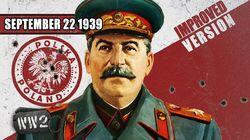
September 22, 1939 (Improved Version)
When the USSR crushes the plans of the Allies for Poland and the Japanese plans in China in the same week, it is Germany that benefits.

September 29, 1939 (Improved Version)
Facing two enemies at once, Poland finds itself in a crushing vice after less than a month of war and the Polish forces must flee their own country to live to fight another day.
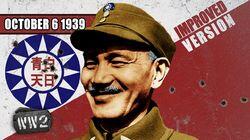
October 6, 1939 (Improved Version)
In the West, the sun sets on Poland as the last forces surrender, but her defenders are already regrouping abroad. In the East, the sun rises on China as Japan meets yet another defeat.
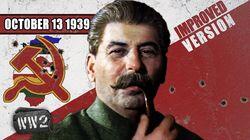
October 13, 1939 (Improved Version)
While the Third Reich and USSR consolidate their Polish conquest, their leaders are wary of each other but turn the attention to the next prize. Stalin moves to the North and Hitler pushes for an attack in the West.

October 20, 1939 (Improved Version)
For the men in the navies of the warring nations in Europe, there was nothing phony about WW2 in October 1939 - mortal danger was immediately under the cold surface at the receiving end of a torpedo or a depth charge...

October 27, 1939 (Improved Version)
The persecution, incarceration, enslavement and murder of the Polish people in occupied Poland is driven by ideological hatred for both Nazi Germany and Soviet Russia, but it's also a personal matter for Joseph Stalin.

November 3, 1939 (Improved Version)
Ten weeks into World War Two, and the Allied ground forces are bored in France. In North-Eastern Europe, Poland's suffering has no end and Finland is in the crosshairs of the USSR.
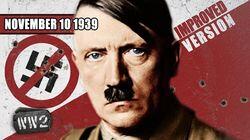
November 10, 1939 (Improved Version)
As Hitler drives for a fast invasion he faces covert and open resistance, even an assassination attempt. In the background British and German agents and double agents play a game of betrayal and counter-betrayal.
Recently Updated Shows

Very Scary People
Host Donnie Wahlberg looks at some of the most-frightening killers in history, retracing their backgrounds, psychology, motives and how they were eventually caught.

The Irrational
The Irrational follows world-renowned professor of behavioral science Alec Mercer as he lends his unique expertise on an array of high-stakes cases involving governments, law enforcement and corporations. His insight and unconventional approach to understanding human behavior lead him and the team on a series of intense, unexpected journeys to solve illogical puzzles and perplexing mysteries.

The Terminal List
Based on the best-selling novel by Jack Carr, The Terminal List follows James Reece after his entire platoon of Navy SEALs is ambushed during a high-stakes covert mission. Reece returns home to his family with conflicting memories of the event and questions about his culpability. However, as new evidence comes to light, Reece discovers dark forces working against him, endangering not only his life but the lives of those he loves.

Babylon 5
From-the-ground-up reboot of the critically acclaimed 1990s series, which revolves around John Sheridan, an Earthforce officer with a mysterious background, who is assigned to Babylon 5, a five-mile-long space station in neutral space, a port of call for travelers, smugglers, corporate explorers and alien diplomats at a time of uneasy peace and the constant threat of war.
